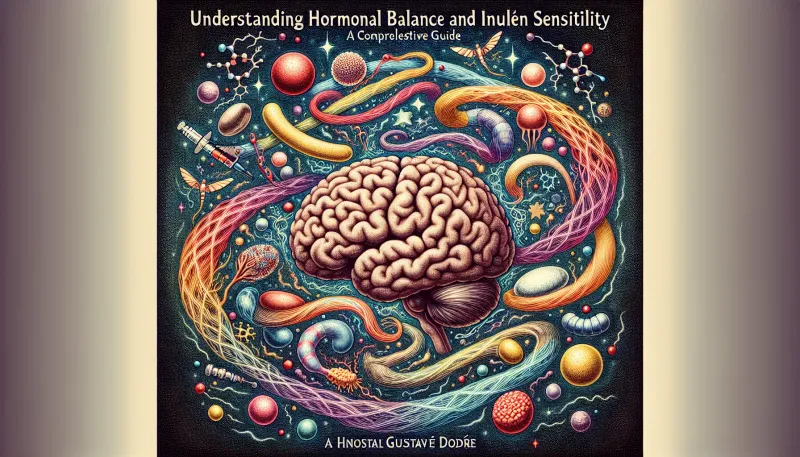Understanding Hormonal Balance and Insulin Sensitivity: A Comprehensive Guide

Discover the importance of hormonal balance and insulin sensitivity, understand their roles in overall health, and learn practical strategies for improving both in this comprehensive guide.
In today's fast-paced world, understanding the intricacies of hormonal balance and insulin sensitivity is crucial for maintaining overall health and well-being. This comprehensive guide aims to demystify these concepts, providing you with the knowledge and tools necessary to manage them effectively.
The Importance of Hormonal Balance
Hormones are chemical messengers that play significant roles in regulating various bodily functions, including metabolism, growth, mood, and reproductive health. Hormonal balance refers to the optimal levels and interactions of these hormones, which are crucial for maintaining overall health.
Common Signs of Hormonal Imbalance
- Chronic fatigue
- Weight gain or difficulty losing weight
- Mood swings or depression
- Irregular menstrual cycles
- Digestive issues
Understanding Insulin Sensitivity
Insulin sensitivity describes how effectively your body responds to the hormone insulin, which regulates blood sugar levels. High insulin sensitivity allows your cells to utilize glucose more efficiently, promoting better energy use and storage.
Why Insulin Sensitivity Matters
Poor insulin sensitivity, also known as insulin resistance, can lead to elevated blood sugar levels. Over time, this can cause serious health issues such as type 2 diabetes, cardiovascular diseases, and metabolic syndrome.
Factors Affecting Hormonal Balance and Insulin Sensitivity
Diet and Nutrition
The foods you consume have a direct impact on hormone production and insulin sensitivity. Diets high in refined sugars and unhealthy fats can disrupt hormonal balance and decrease insulin sensitivity.
Exercise and Physical Activity
Regular physical activity helps maintain hormonal balance and increases insulin sensitivity. Activities such as strength training and aerobic exercises are particularly beneficial.
Stress Management
Chronic stress can elevate cortisol levels, which negatively affect other hormones and insulin sensitivity. Effective stress management techniques such as meditation, yoga, and deep breathing exercises can help mitigate these effects.
Sleep Quality
Insufficient or poor-quality sleep can disrupt hormonal balance and decrease insulin sensitivity. Prioritizing good sleep hygiene is essential for overall health.
Strategies to Improve Hormonal Balance and Insulin Sensitivity
Adopt a Balanced Diet
Incorporate a variety of whole foods, including vegetables, fruits, lean proteins, and healthy fats. Avoid highly processed foods, sugary beverages, and excessive alcohol consumption.
Stay Physically Active
Aim for at least 150 minutes of moderate-intensity exercise or 75 minutes of high-intensity exercise each week. Include both cardiovascular and strength training exercises.
Manage Stress Effectively
Incorporate stress-reducing activities into your daily routine. Techniques such as mindfulness, deep breathing exercises, and physical activities can help reduce stress levels.
Prioritize Quality Sleep
Establish a consistent sleep schedule, aim for 7-9 hours of sleep per night, and create a peaceful sleeping environment. Avoid screens and stimulants before bedtime.
Conclusion
Achieving and maintaining hormonal balance and insulin sensitivity are key components of overall health. By understanding the factors that influence these aspects and implementing practical strategies, you can significantly improve your well-being. Adopt a holistic approach that includes a balanced diet, regular exercise, effective stress management, and prioritizing quality sleep to ensure optimal hormone levels and insulin sensitivity.
Remember, always consult with healthcare professionals before making significant changes to your lifestyle or if you have concerns about your hormonal health or insulin sensitivity.



























